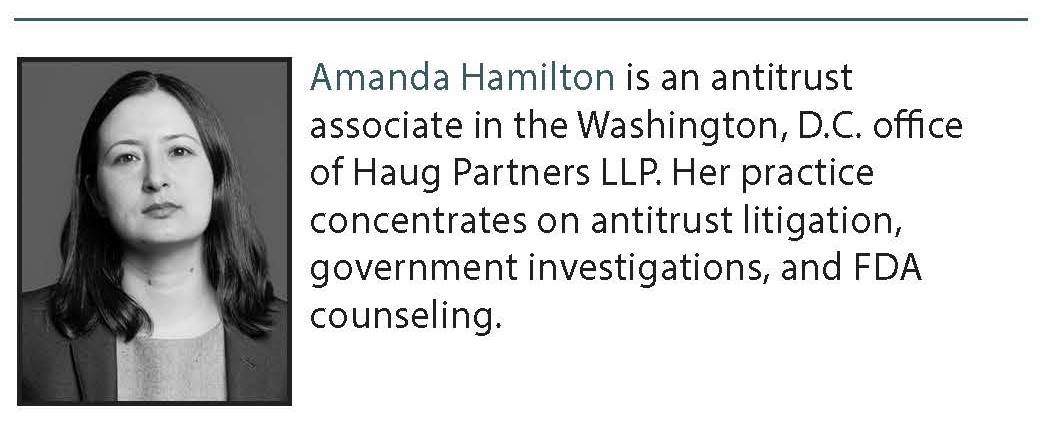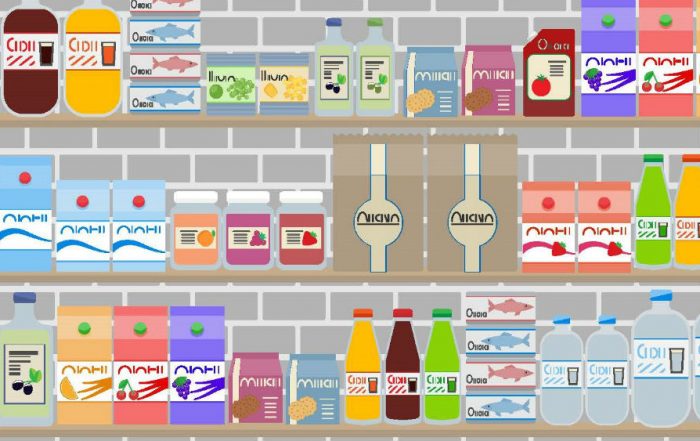
Navigating an FTC Drug Pricing Investigation
by Amanda Hamilton
Pharmaceutical drug prices have captured the nation’s attention in recent times. From consumers to the President, all have expressed deep concern over high drug prices. At a rally in Kentucky, President Trump exclaimed that “[t]he cost of medicine in this country is outrageous.”2 Scott Gottlieb, President Trump’s pick for U.S. Food and Drug Administration (FDA) Commissioner, echoed this sentiment recently by calling high drug prices a “public health concern.”3
One federal agency, the Federal Trade Commission (FTC or Commission), has been investigating complaints about high drug prices and, in a few instances, has brought an enforcement action. While FTC does not have the authority to bring an enforcement action based on a pharmaceutical drug price alone, the agency can bring an action if an antitrust violation is the reason for the high price. If you or your client is the subject of an FTC pricing investigation, it can be difficult to know what to expect because FTC investigations are nonpublic. This article provides insight into the FTC investigational process.
Background on the Federal Trade Commission
FTC is a bipartisan law enforcement agency with a mission to protect consumers and promote competition. By statute, the Commission consists of five Commissioners appointed by the President subject to Senate confirmation, each serving staggered seven-year terms.4 No more than three Commissioners can be of the same political party, and the President chooses one of the Commissioners to act as Chairman.5 In order for the Commission to authorize a formal investigation or initiate a law enforcement action, there needs to be a majority vote by Commissioners authorizing the action. Currently, there are only two Commissioners, so there needs to be a unanimous vote for the Commission to act. A split vote (i.e., 1-1 vote) will result in no action by the Commission. President Trump has nominated additional Commissioners, however they have not yet received Senate confirmation.6
One of the ways FTC carries out its mission of protecting consumers and promoting competition is by enforcing the antitrust laws.7 The federal antitrust laws apply to virtually all industries including the pharmaceutical sector. They prohibit business practices and mergers that “unreasonably deprive consumers of the benefits of competition, resulting in higher prices for inferior products and services.”8
Both FTC and the Department of Justice, Antitrust Division are the primary enforcers of federal antitrust laws. But FTC’s antitrust arm, the Bureau of Competition, “exercises primary responsibility for civil antitrust enforcement in the pharmaceutical industry.”9 The division within the Bureau of Competition responsible for investigating pharmaceutical companies’ business practices is the Health Care Division (Health Care). The Health Care staff investigates potential antitrust law violations and seeks legal remedies in federal court or in FTC administrative proceedings.
Authority for Pricing Investigations
FTC cannot bring an enforcement action against a pharmaceutical company for simply charging high prices.10 As noted by now acting Chair Maureen K. Ohlhausen, “[s]tanding alone, a ‘high’ pharmaceutical price is not an antitrust violation if it simply reflects a legally obtained intellectual property right.”11 There are no federal laws that prohibit high prices.12 And FTC cannot use its antitrust or rulemaking authority to regulate pharmaceutical drug prices either.13
FTC can bring an enforcement action to prevent unfair methods of competition. This sort of conduct—such as illegal anticompetitive agreements among competitors to increase prices or restrict supply, and illegal exclusionary or predatory practices—often results in higher prices. When the Health Care staff launches a pricing investigation, they are trying to determine whether unfair methods of competition caused the higher prices.
The Investigation
by staff as a result of a consumer or competitor complaint, referral from FDA, request by Congress, or a news article.14 For example, Senator Amy Klobuchar (D-MN) asked FTC to investigate Ovation for price-gouging and anti-competitive practices in Spring 2008.15 According to Senator Klobuchar, Ovation had increased the price for Indocin IV by more than 18 times, from $100 to $1,800 per unit.16 The Commission initiated an investigation and subsequently sued Ovation in federal court.17 Similarly, FTC sent Mylan a request for information as part of a preliminary investigation of the company’s business practices relating to EpiPen.18 This request also followed calls from Congressional leaders and widespread reporting on the price of EpiPen.19
In the initial stage of an investigation, staff will review public sources of information to determine if the high price is a result of “normal market forces and thus [does] not present an antitrust issue.”20 For example, a common cause of price spikes that does not necessarily raise antitrust concern is supply problems, such as an ingredient shortage.21 At this early stage of the investigation, staff may seek information from a company (known as the target company) through an informal request for information (i.e., voluntary request letter). With an informal request, staff will likely ask for a limited amount of data, documents, and information to learn basic facts about the drug and its market (e.g., existing and potential competitors, sales, customers, etc.).
If staff is unable to rule out normal market forces as a cause, they will continue to investigate to determine if the target company used unreasonable restraints of trade to facilitate or protect a price increase.22 At this point, staff will likely seek information from the target company and other relevant third parties (such as pharmacy benefit managers, generic companies who seek to market generic versions of the branded drug, etc.) through formal requests for information (i.e., a Civil Investigative Demand (CID) or subpoena). To issue a formal request for information, staff must ask the Commission to authorize what is known as compulsory process by submitting a memorandum explaining potential legal theories for the matter, facts already known, and the reasons for requesting compulsory process (e.g., avoid delay or inability to receive complete information from companies without a formal request).23
A CID usually requests data and contains interrogatories. For document requests, staff can either send a subpoena or ask for documents through a CID. Staff gives a company a set period of time to comply with the requests and typically grants extensions for complying. Staff is also generally open to negotiating the scope of formal requests to reduce the burden and costs as long as the Commission will still receive the documents and information needed to investigate the matter. For example, “FTC staff typically negotiates whose files to search for information, modifies definitions, excludes certain categories of documents or information . . . .”24
The Commission can seek to enforce the CID or subpoena in federal court if the Commission determines that a company has refused to fully comply with the request or did not have a legitimate basis to withhold documents.25 The Commission has exercised this right in the recent past. For example, the Commission enforced a subpoena in federal district court against Boehringer Ingelheim Pharmaceuticals (Boehringer).26 There, the Commission requested business and financial analyses relating to patent litigation settlement agreements. 27 Boehringer withheld those documents and claimed privilege. 28 Specifically, the company argued that the analyses are opinion work product because they were prepared at the request of counsel.29 The D.C. Circuit disagreed.30 The court held that that counsel’s mere request for financial analyses during settlement discussions did not make those analyses opinion work product.31 This enforcement action demonstrates that Health Care staff reviews the privilege logs submitted carefully and will seek to enforce a subpoena if necessary.
Potential legal theories that staff may investigate include:
Collusion — Whether the pharmaceutical company entered into an agreement with a competitor or competitors on price or output.
Acquisition — Did the company illegally acquire a competing drug? For this inquiry, staff will also look to see whether the company illegally acquired a potential competitor, such as a drug that has not yet received FDA’s approval to market in the U.S.
Denying Access to Customers — Whether the pharmaceutical company entered into exclusive supply arrangements with insurers, distributors, or pharmacies to deny competitors’ access to customers.
Denying Access to Inputs — Staff will review supply contracts to determine whether the company entered into exclusionary agreements to deny competitors access to ingredients necessary to manufacture the drugs.
Delayed Entry — Whether the pharmaceutical company’s actions delayed entry of a competitor. Specifically, staff will look to see whether the pharmaceutical company engaged in any of the following conduct to delay a competitor’s entry:
1) entered into a so-called “reverse payment” settlement with any generic competitors — A patent settlement agreement where the branded company agrees to pay the generic company a large, unjustified payment in exchange for delayed entry.
2) filed a sham citizen petition with FDA — A company files an objectively baseless citizen petition with FDA, which prevents FDA from approving a competing drug product until the agency rules on the petition.
3) filed sham litigation against a potential competitor — A company files an objectively baseless patent infringement lawsuit to delay FDA approval of a generic competitor.
4) engaged in product hopping — A company “make[s] trivial and non-therapeutic changes to existing drugs that make generic substitution laws inapplicable to a new formulation.”32
5) refusals to deal — An example of a refusal to deal could occur in the Risk Evaluation and Mitigation Strategy (REMS) context. FDA will require drug companies to propose and implement REMS for certain drugs whose risk-benefit profiles warrant safety measures beyond professional labeling. An example of refusal to deal in the REMS context is where a branded company uses REMS distribution restrictions to deny generic companies drug samples.
Further Commission Action
Upon concluding a pricing investigation, the Commission may simply close the investigation. In that case, the target pharmaceutical company will receive written confirmation that FTC has concluded its investigation and offering to return or destroy information provided to the staff. In some instances, the Commission may authorize an enforcement action. Below are two notable examples of where FTC concluded that an antitrust violation was the underlying cause of the high prices. In both, FTC alleged that an acquisition allowed the incumbent pharmaceutical company to preserve its monopoly.
FTC v. Mallinckrodt ARD Inc, Civil Action No. 1:17-cv-00120 (D.D.C.)
On January 18, 2017, FTC and Attorneys General33 of Alaska, Maryland, New York, Texas, and Washington filed a complaint in federal district court for the District of Columbia alleging that Mallinckrodt ARD Inc. (Mallinckrodt) illegally maintained its monopoly on H.P. Acthar Gel (repository corticotrophin) by acquiring rights to develop and market a potential competitor product.34 FDA approved H.P. Acthar Gel on April 29, 1952 for multiple indications.35 The label was later expanded to include multiple sclerosis in 1972 and infantile spasms in pediatric patients in 2010.36 In June 2013, Mallinckrodt acquired a potential competitor product, Synacthen Depot, a synthetic ACTH alternative to H.P. Acthar Gel used in Europe, Canada, and other parts of the world.37 At the time of the acquisition, Synacthen Depot had not yet received FDA approval for sale in the U.S.38
FTC alleged that this acquisition allowed Mallinckrodt to “thwart[] a nascent challenge to its H.P. Acthar Gel monopoly and thereby harmed competition.”39 According to the complaint, Mallinckrodt repeatedly raised the price of H.P. Acthar Gel from $40 per vial in 2001 to more than $34,000 per vial.40 The complaint further alleged that the acquisition stifled competition by preventing any other company from using the Synacthen assets to develop a synthetic ACTH drug, preserving Mallinckrodt’s monopoly and allowing it to maintain extremely high prices for H.P. Acthar Gel.41 Mallinckrodt agreed to settle the case. Under a stipulated court order, Mallinckrodt must make a $100 million monetary payment to FTC.42 The states will receive $10 million from the $100 million judgment and an additional $2 million as a payment for attorney’s fees and costs.43 Mallinckrodt must also grant a license to develop Synacthen Depot to treat infantile spasms and nephrotic syndrome to a licensee approved by the Commission.44
FTC v. Lundbeck, Inc., Civil No. 0:08-cv-06379-JNE-JJG (D. Minn.)
In December 2008, FTC brought a complaint against Ovation Pharmaceuticals (which was purchased in 2009 and renamed Lundbeck, Inc.) (Ovation) challenging Ovation’s purchase of the U.S. rights to NeoProfen (ibuprofen lysine).45 FDA approved NeoProfen on April 13, 2016, and the drug received orphan drug exclusivity for the treatment of patent ductus arteriosus (PDA), a congenital heart defect usually found in severely underweight premature babies.46 At the time of the purchase, Ovation already had rights to Indocin I.V. (indomethacin for injection), which also treats PDA.47
According to FTC’s complaint, Ovation’s acquisition of NeoProfen eliminated its only competitor for the treatment of PDA.48 This allowed Ovation to preserve its monopoly and raise the price of Indocin IV nearly 1,300 percent from $36 to nearly $500 per vial.49 When it launched NeoProfen in July 2006, Ovation set a similarly inflated price.50 The complaint sought equitable relief, including divestiture and disgorgement of unlawfully obtained profits from Ovation’s sales of Indocin I.V. and NeoProfen.51 The district court held that FTC did not prove that NeoProfen and Indocin compete in the same product market, and therefore, that FTC had failed to show that the acquisition substantially lessened competition or maintained a monopoly.52 The Eighth Circuit affirmed the district court’s opinion.53
Being a target of an FTC pricing investigation is never ideal. It can be costly and time-consuming. However, knowing what to expect can help you navigate your client or company through what would otherwise be a murky process.
- The views in this article are my own and do not necessarily reflect the views of Haug Partners LLP or the firm’s clients.
- Lydia Ramsey, Trump says he wants to tackle drug pricing in the GOP’s Obamacare replacement plan, Business Insider (Mar. 21, 2017, 10:43 AM), http://www.businessinsider.com/trump-wants-drug-pricing-added-to-ahca-2017-3.
- Thomas M. Burton, FDA Chief Says High Drug Prices ‘Public Health Concern’ Agency Should Address, The Wall Street Journal (Oct. 2, 2017, 11:20 AM), https://www.wsj.com/articles/fda-chief-says-high-drug-prices-public-health-concern-agency-should-address-1506957609.
- Federal Trade Commission, Commissioners, https://www.ftc.gov/about-ftc/commissioners.
- Id.
- The current FTC Commissioners are Maureen K. Ohlhausen and Terrell McSweeny. In October 2017, President Trump nominated Joe Simons to serve as Chairman and Rohit Chopra. By time of publication, Simons and Chopra may have received Senate confirmation.
- Federal Trade Commission Act, 15 U.S.C. §§ 41-58; Clayton Act, 15 U.S.C. §§ 12-27.
- U.S. Dep’t of Justice, Antitrust Enforcement and the Consumer, https://www.justice.gov/atr/file/800691/download.
- Antitrust Concerns and the FDA Approval Process Before the S. Comm. on Regulatory Reform, Commercial and Antitrust Law of the H. Comm. on the Judiciary, 115th Cong. 2 (2017) (prepared statement of Markus H. Meier, Acting Director, Bureau of Competition FTC).
- Transcript of FDA Public Meeting at 36, The Hatch-Waxman Amendments: Ensuring a Balance Between Innovation and Access (July 18, 2017), https://www.fda.gov/downloads/Drugs/NewsEvents/UCM571419.pdf.
- FTC, Concurring Statement of Commissioner Maureen K. Ohlhausen In the Matter of Mallinckrodt ARD Inc., (Jan. 18, 2017), https://www.ftc.gov/public-statements/2017/01/concurring-statement-commissioner-maureen-k-ohlhausen-matter-mallinckrodt.
- Transcript of FDA Public Meeting, supra note 10, at 36.
- See Maureen K. Ohlhausen, Acting Chairman, FTC, The FTC’s Path Ahead at GCR Live 6th Annual Antitrust Law Leaders Forum (Feb. 3, 2017), https://www.ftc.gov/system/files/documents/public_statements/1070123/gcr_the-ftc_path_ahead.pdf.
- FTC, Initiation of An Investigation, Operating Manual, ch.1.3.3, https://www.ftc.gov/sites/default/files/attachments/ftc-administrative-staff-manuals/ch01overview.pdf
- Senator Amy Klobuchar, Klobuchar Calls for Action to Stop Price-Gouging in Specialized Prescription Drugs (July 25, 2008), https://www.klobuchar.senate.gov/public/index.cfm/events-speeches-and-floor-statements?ID=306D4471-1F8F-42AC-9875-C443CBB202FA.
- Id.
- See FTC v. Lundbeck, Inc., Civil No. 0:08-cv-06379-JNE-JJG (D. Minn.).
- Jonathan D. Rockoff, Federal Trade Commission Questions Mylan on EpiPen, The Wall Street Journal (Jan. 30, 2017, 5:44 pm), https://www.wsj.com/articles/federal-trade-commission-questions-mylan-on-epipen-1485816270.
- Id.; Senator Chuck Grassley, Judiciary Committee Leaders Seek FTC Review of EpiPen Maker for Potential Antitrust Violations (Nov. 7, 2016), https://www.grassley.senate.gov/news/news-releases/judiciary-committee-leaders-seek-ftc-review-epipen-maker-potential-antitrust.
- FTC, From the antitrust mailbag: What can the FTC do about prescription drug price spikes?, Competition Matters Blog (May 18, 2015), https://www.ftc.gov/news-events/blogs/competition-matters/2015/05/antitrust-mailbag-what-can-ftc-do-about-prescription.
- Id.
- See FTC, From the antitrust mailbag: What can the FTC do about prescription drug price spikes?, supra note 20.
- FTC, Use of Compulsory Procedures: Justification, Operating Manual, ch.3.6.7.2, https://www.ftc.gov/sites/default/files/attachments/ftc-administrative-staff-manuals/ch03investigations_0.pdf
- FTC, Separating fact from opinion, Competition Matters Blog (Mar. 4, 2015), https://www.ftc.gov/news-events/blogs/competition-matters/2015/03/separating-fact-opinion.
- Id.
- Id.
- Id.
- Id.
- Id.
- FTC v. Boehringer Ingelheim Pharm. Inc., 778 F.3d 142, 151-152 (D.C. Cir. 2015).
- Id.
- Brief for FTC as Amici Curiae Supporting Plaintiff-Appellant, Mylan Pharm., Inc. v. Warner-Chilcott PLC, 838 F.3d 421 (3d. Cir. 2016), 2016 WL 6137296, at *1.
- State Attorneys General and staff have historically cooperated on investigations. They coordinate on collecting information from the target company by sending similar subpoenas or CIDs—a request that asks for all the documents and data provided to the FTC or to the state Attorney General. This effort can often result in the FTC and state Attorney General filing a joint law enforcement action or joint settlement. However, this does not always happen, there are times where the state Attorney General will file its own suit or will require a settlement different from the FTC’s.
- Complaint at 12, FTC v. Mallinckrodt ARD Inc., No. 17-00120 (D.D.C. filed Jan. 18, 2017) (hereinafter “Mallinckrodt Compl.”). Questcor owns the rights to H.P. Acthar, and Mallinckrodt acquired Questcor on August 14, 2014. Id. at 4.
- FDA, NDA 022432 Approval Letter, at 3 (Oct. 15, 2010), https://www.accessdata.fda.gov/drugsatfda_docs/appletter/2010/022432s000ltr.pdf.
- Id.
- Mallinckrodt Compl. at 3.
- Id. at 3, 8.
- Id. at 12.
- Id. at 2.
- Id. at 3, 12-13.
- FTC, Mallinckrodt Will Pay $100 Million to Settle FTC, State Charges It Illegally Maintained its Monopoly of Specialty Drug Used to Treat Infants (Jan. 18, 2017), https://www.ftc.gov/news-events/press-releases/2017/01/mallinckrodt-will-pay-100-million-settle-ftc-state-charges-it.
- Id.
- Id.
- Complaint, FTC v. Ovation Pharm., Inc., No. 08-0637 (D. Minn. filed Dec. 16, 2008) (hereinafter “Ovation Compl.”).
- FDA, Orphan Drug Product Designation for NeoProfen, https://www.accessdata.fda.gov/scripts/opdlisting/oopd/detailedIndex.cfm?cfgridkey=101496. The exclusivity ended on April 13, 2013. Id.
- Ovation Compl. at 1-2.
- Id. at 2.
- Id. at 5.
- Id. at 6.
- Id. at 11.
- FTC, Ovation Pharmaceuticals, Inc. d/b/a, Cases and Proceedings (Oct. 3, 2011), https://www.ftc.gov/enforcement/cases-proceedings/081-0156/ovation-pharmaceuticals-inc-dba.
- Id.
Update Magazine
January/February 2018






